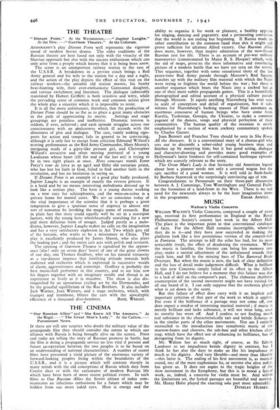THE CINEMA
" Our Russian Allies" and " She Knew All The Answers." At the Regal.—" The Great Man's Lady." At the Carlton.— Paramount News.
IF there are still any sceptics who doubt the military value of the propaganda film they should consider the extent to which our alliance with Russia is being brought alive on the screen. Press and radio are telling the story of Russian prowess in battle, but the film is doing a propaganda service no less vital if present and future co-operation between the two peoples is to be based on an understanding of national characteristics. A number of recent films have presented a vivid picture of the enormous variety of forward-looking peoples living within the boundaries of the U.S.S.R., and it is a picture which will contrast sharply in many minds with the old conceptions of Russia which date from Czarist days or with the caricatures of modern Russian life which have been born of more recent political events. In such films as Our Russian Allies the Soviet citizen of today com- municates an infectious enthusiasm for a future which may be hidden from our more jaded eyes. Here is energy and the ability to organise it for work or pleasure, a healthy appetite for singing, dancing and pageantry; and a permeating conviction that the world is not ending but beginning. If Russia made no other contribution to the common fund than this it might still prove sufficient for ultimate Allied victory. Our Russian Allies does more, however, than inspire admiration of the new-found Russian zest for life. There is an account of pre-war military manoeuvres (commentated by Major R. S. Hooper) which, with the aid of maps, preseats the most informative and convincing picture of a modern battle that we have yet seen on the screen. This sequence, together with some sensational shots of the last peace-time Red Army parade through Moscow's Red Square, matches up with the military film material with which the Nazis were trying to frighten the world before the war ; but there is another sequence which beats the Nazis into a cocked hat at one of their more subtle propaganda games. This is a beautifully photographed and edited account of a physical culture parade through Moscow. It equals anything Nuremberg has ever seen in scale of conception and detail of organisation, but it sub- stitutes for Nuremberg's barking masses of Nazi automata an enormous concourse of human beings who have come from Karelia, Turkestan, Georgia, the Ukraine, to make a common pageant of the dances, songs and physical perfection of their communities. The human quality of the occasion is nicely emphasised by a section of warm cockney commentary spoken by Charles Garner.
Joan Bennett and Franchot Tone should be seen in She Knew All the Answers. It is a conventional story of a chorus-girl who sets out to discomfit a sober-sided young business man and finishes up by marrying him; but it has good acting, dialogue and character-drawing and provides many good examples of Hollywood's latest fondness for self-contained burlesque episodes which are scarcely relevant to the story.
The Great Man's Lady is that favourite old American legend about how a pioneer needs not only a covered wagon but the epic sacrifice of a good woman. It is well told in flash-backs by Barbara Stanwyck at the surprisingly convincing age of tog,.
Congratulations to Paramount on their three-part discussion between A. J. Cummings, Tom Wintringham and General Fuller on the formation of a land-front in the West. There is no real need for the newsreels always to be the least imaginative items






















 Previous page
Previous page